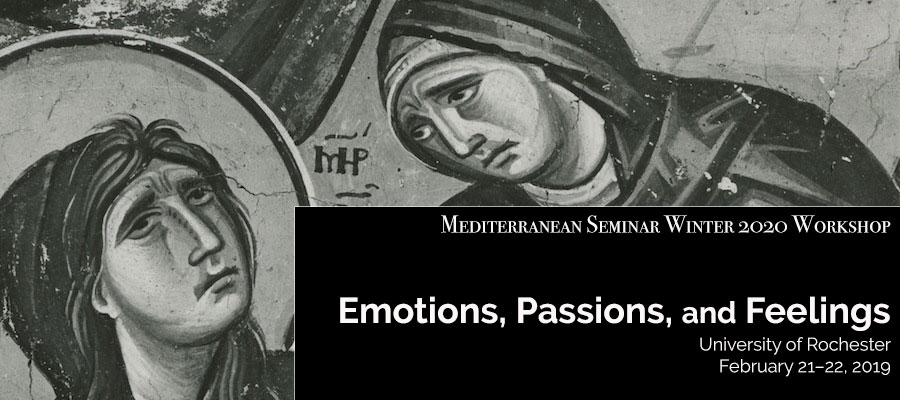Emotions, Passions, and Feelings, Mediterranean Seminar Winter 2020 Workshop, University of Rochester, February 21–22, 2019
Workshop paper proposals and round-table participants are being sought for the Mediterranean Seminar’s Winter 2020 meeting on the subject of “Emotions, Passions, and Feelings,” to be held at the University of Rochester (Rochester NY) on 21 & 22 February 2020. This two-day event includes of a one-day workshop, featuring three chapters- or articles-in-progress and a one-day symposium, featuring three round-table discussions. There will be keynote speakers each day.
The historical studies of emotions have shown that emotions are integral to socialization and culture. In exploring how past peoples have defined, experienced, expressed, constrained, and valued various feelings, historians of emotions have argued that these are culturally constituted and that they are intimately connected to other concerns. As a meeting point of multiple religious and cultural traditions, the Mediterranean offers scholars of emotions an opportunity to consider how emotions were means to establish, to ascertain, and to communicate identity. For Mediterraneanists, emotions are an underexplored aspect of the various kinds of inter-cultural contacts that define their field and which offers new ways to think about the Mediterranean world. Mediterranean Studies thus presents an ideal framework for considering the larger issues discussed in the history of emotions: their universality, relativity, purpose, their place in power structures, their differences depending on race, ethnicity, gender, and their significance in inter-faith and inter-cultural relations.
For the workshop (to be held on Friday, 21 February), we invite abstracts of in-progress (unpublished) drafts of articles or book/dissertation chapters on any aspect of emotions, passions, and feelings and on literary and artistic representations of such in the historical Mediterranean. Papers with a comparative approach or theoretical orientation are particularly welcome.
All North American-based scholars (or foreign scholars who will be in the US at this time) working on relevant material in history, art history, religious studies, literary and cultural studies, anthropology or any relevant Humanities and Social Sciences discipline are encouraged to apply. Scholars from further abroad may apply but we cannot pay full travel costs. ABD PhD students, junior and non-tenure track faculty are particularly encouraged to submit proposals.
Our Mediterranean is construed geographically as including southern Europe, the Near and Middle East and North Africa and into the Black Sea and Central Asia, and the Red Sea and Indian Ocean.
The workshop will also feature keynote presentations “Trust and Faith in the Late Medieval Mediterranean” by Naama Cohen-Hanegbi (Tel Aviv University) and, “Gender and Emotion in Venice's Mediterranean Empire,” by Erin Maglaque (University of Sheffield).
The second day, Saturday, 22 February, will feature three round-table conversations, focusing on the following questions:
- Are there “Mediterranean” emotions, and can we do their history?
- How has gender in the Mediterranean world defined or been defined by emotional norms?
- How has race/ethnicity/identity in the Mediterranean world defined or been defined by emotional norms?
Applicants may submit proposals for both a workshop presentation and round-table discussion.
Workshop presenters will have their travel and accommodation covered; round-table presenters will have their accommodation covered.
